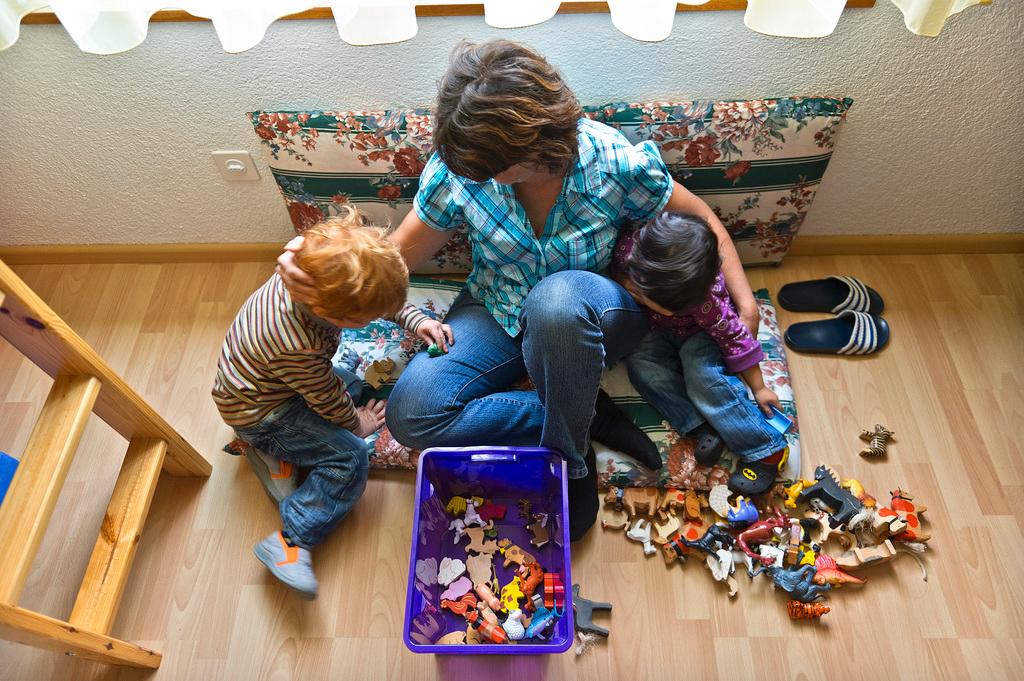What do kids want to be when they grow up?

It’s 2016, yet gender bias still affects how people manage work-life balance in Switzerland. Researchers are investigating how the Swiss labour market influences girls’ and boys’ career plans…and vice versa.
From the moment she begins talking, it’s clear that Sabrina Würsch is passionate about machines. At 19, Würsch is in her fourth and final year of a polymechanics apprenticeship at global machine construction firm Bühler in Uzwil, St Gallen. This fall, she will start earning her university degree in machine engineering.
“In school, I always liked to work with metal,” says Würsch of her chosen metier, which consists of designing and producing equipment for different manufacturing processes.
“I always had more friends that were boys than girls, but I liked [polymechanics] not because of my friends; I think the biggest influence for me was that I always wanted to invent something”.
According to University of Lausanne (UNIL) researcher Lavinia Gianettoni, who is the lead author of a recent study on the professional aspirations of Swiss youth, girls are more likely than boys to venture across traditional gender lines when it comes to choosing a career path.
What is a ‘typical’ profession?
In their study, the researchers defined a profession as being “typical” of a particular gender if 70% or more of positions were occupied by people of that gender, on average. Likewise, “atypical” professions were those in which 30% or fewer of positions were held by that gender, on average.
“For girls, [a gender-atypical professional aspiration] is not as problematic because masculine careers are more valorised – it is positive for girls to aspire to masculine jobs,” explains Gianettoni. “For boys to aspire to feminine jobs is perceived more negatively.”
Out of 20 schools across Switzerland, Gianettoni and her colleagues surveyed 3,302 students between the ages of 13 and 15 – a crucial time of transition and career decision-making. The data were gathered in 2011 as part of the Swiss National Science Foundation National Research Programme (NRP) 60 project: “More equal opportunity in the choice of careers”.
When asked about their plans, twice as many boys as girls (64% versus 32%) selected professions that were defined as “typical” of their gender, such as a sports professional, policeman or engineer. Only 7% expressed interest in typically feminine careers like a nurse, primary school teacher, or beautician.
And those are just stated career plans, which may not necessarily be borne out in practice. As swissinfo.ch reported in 2013 based on another NRP 60 study focusing on young adults in Switzerland, just 1% of the 6,000 professionals surveyed who had been interested in gender atypical careers at age 16 were actually doing that type of work seven years later.
Flexibility or promotability?
The NRP 60 survey results revealed gender differences not just in the desired type of profession, but also in the amount of time worked. Girls appeared to be considering the constraints of balancing a career with family very early on, with 62% reporting that they planned to work part-time (30 hours or less per week) for family reasons.
“The result that amazed me the most was that girls see very strongly the need to reconcile work and family, and to work in professions that permit part-time work,” Gianettoni says.
Today, six out of 10External link working women in Switzerland hold a part-time position, compared to 1.6 working men out of 10. While it can give women more flexibility to balance family and professional obligations, part-time work is associated with job insecurity, decreased welfare options, and fewer opportunities for professional advancement.
“If you are under a flexible or temporary work contract, you are more likely to be laid off in times of crisis and you are less likely to be promoted in times of promotion,“ explains Peter Vogel, a professor at the University of St Gallen and author of the book “Generation Jobless?”.
“A company will most likely choose [to promote] someone working at 100% over someone working 50% or 60% despite their qualifications, which is a pity, but that is what most companies will do. Then, it is not surprising that fewer women end up in top management. That is where companies need to change something.”
Roles and responsibilities
Like Würsch, nearly two-thirds of Swiss students choose to do an apprenticeship, which combines coursework and vocational work experience. Apprenticeships are one of the main reasons Switzerland can boast comparatively low youth unemployment; on the other hand, they typically have to make a choice at 13-15 years of age – arguably before many students have had time to explore options that go beyond traditional career expectations.
“I think it’s better if you start a little later because at this age you don’t want to decide your future – it is probably a little better to have one or two years to think about it,” says Würsch, who began her apprenticeship at 16. “But you can get your own experience very early, which is an advantage – you become grown-up a little earlier.”
Swiss culture also tends to strongly emphasise the role of family in raising children; parental leave benefits did not become part of the Swiss labour model until 2005, and they are still among the lowest-ranked in Europe, available only to new mothers at 80% pay for 14 weeks. Anything beyond that, including paid leave for fathers, is up to each individual employer’s discretion.

More
Switzerland: home to the world’s most expensive crèches
Childcare varies widely among cantons and communes, but one thing many systems have in common is a lack of space and affordable resources.
“There are not enough places in crèches [day care centres] in Switzerland for all those who need it, for one thing,” says Gianettoni. “For another, it is very expensive. Sometimes, an entire average salary must be devoted to paying for a crèche, which demotivates people, especially women, from working. “
Gianettoni says that one reason other European countries like Sweden and Norway rate higher than Switzerland when it comes to supporting working parents is the perceived role of the individual versus the state in managing work-life balance.
“In northern countries, there is a clearer institutional responsibility,” she explains.
Gianettoni believes that schools also have a responsibility to sensitise students to the fact that there are not necessarily different jobs for men and women.
“There is no reason why a woman can’t drive a tractor why a boy can’t be interested in taking care of children – I think that could be a role for the school as well,” she says.
Würsch, who fell in love with metalworking during an extracurricular programme organised by her secondary school, says she has never been pressured to change her own “atypical” career path, but feels that more support is needed.
“At first, my teachers thought [polymechanics] was a really hard job to do because I am small – I don’t look very strong,” she says. “But it was the perfect decision for me. So I think from the teachers, there should come more support for their students’ decisions. I think it’s better to try something than to regret that you didn’t do it.”
Switzerland and gender equality
A look at Switzerland’s history reveals a complicated relationship with gender equality. Women didn’t receive the right to vote at the federal level until 1971, and in Appenzell Inner Rhoden, the right to vote at a cantonal level eluded women until 1990. In 1996, the Federal Act on Gender EqualityExternal link specifically prohibited discrimination in paid employment between men and women. Yet according to the Federal Statistical Office, the median monthly wage for women in the Swiss private sector was CHF5,317 in 2012, compared to CHF6,553 for men – representing a wage gap of 18.9%.

In compliance with the JTI standards
More: SWI swissinfo.ch certified by the Journalism Trust Initiative












You can find an overview of ongoing debates with our journalists here . Please join us!
If you want to start a conversation about a topic raised in this article or want to report factual errors, email us at english@swissinfo.ch.